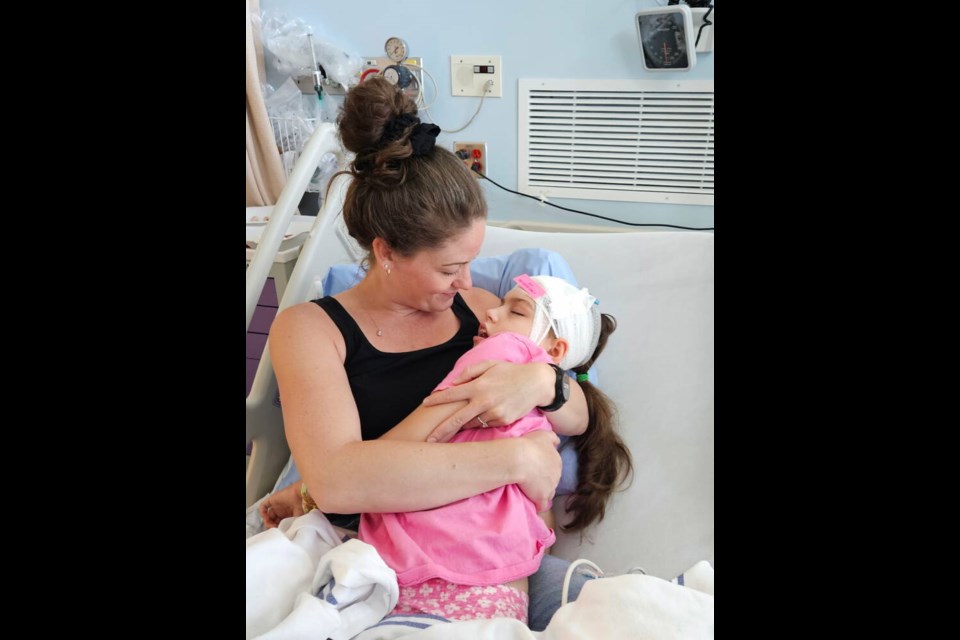B.C. has reversed its decision to cut off drug coverage for a 10-year-old Langford girl with a rare terminal disease.
On Thursday evening, Health Minister Josie Osborne contacted the family of Charleigh Pollock to say the province will restore the funding.
Charleigh has taken the drug Brineura since she was three to slow the progression of Batten disease (CLN2), a fatal neurodegenerative disorder. It costs about $800,000 a year. Funding was cut off this spring, based on the advice of a committee of independent experts.
“I confirmed to them that I have reinstated Charleigh’s Brineura coverage and that coverage will be available to them for as long as the treating physician and the family deem it appropriate,” Osborne said.
Charleigh’s mother, Jori Fales, said the health minister told her that Charleigh can recieve the infusions “for as long as she needs them.”
Through tears, Fales said she is beyond grateful “to all the beautiful humans that have moved mountains for our precious girl.” The compassion Charleigh and the family has received is unmatched, she said.
The reversal comes on the heels of a letter to Osborne from a group of rare-disease experts including 11 physicians and two researchers from the U.S.-based Batten Disease Centers of Excellence and U.S. Batten Disease Clinical Research Consortium. They have cared for the majority of U.S. patients with CLN2 treated with Brineura and presented the case for restoring funding.
“We strongly oppose the decision to withdraw funding for life-sustaining enzyme replacement therapy from Charleigh Pollock and call for a review of the current discontinuation criteria,” the letter said.
Charleigh’s last publicly funded infusion at Victoria General Hospital was June 19, but online fundraising enabled her to resume biweekly infusions on Thursday. Each infusion costs about $33,000.
Prior to 2017, the late-infancy form of CLN2 that Charleigh has was “universally fatal” with no treatment available, but Brineura’s enzyme replacement therapy has “demonstrably prolonged survival, slowed progression, improved seizure control and enhanced quality of life,” the letter said.
The experts said the criteria for discontinuing the drug, which are based on a patient’s motor and language skills — Charleigh can no longer talk or walk — don’t take into account cognition, feeding, breathing, reduced seizures and hospitalization, or quality of life as assessed by family and the medical care team.
“Based upon our clinical experience, treated children with CLN2 disease with severely limited mobility and language may continue to meaningfully interact with their environment and communicate non-verbally for years without the need for nutritional or respiratory support,” they said.
Such children are far from imminent death, the letter said.
Osborne said Thursday she continues to strongly believe that decisions about medical care should be made by health experts to ensure they are based on the best available evidence.
“The letter I received today from Batten disease experts confirms there is significant disagreement between health experts on Brineura, and it is not acceptable that Charleigh and her family suffer as a result of that disagreement about the use of Brineura for Batten Disease,” Osborne said in a statement.
Coverage decisions by the province’s Expensive Drugs for Rare Disease program are based on the advice of independent experts and lay members as part of the Canadian Drug Expert Committee appointed by Canada’s Drug Agency. The program, which was established in 2007, covers about 30 drugs for rare diseases in the province.
Since the province’s review process was set up, it has never provided ongoing coverage against recommendations from the committee.
The experts said they agree with Canada’s Drug Agency’s conclusion that: “decisions to stop treatment would be made in the context of the child’s symptoms, treatment goals of the family, and the physician’s professional judgment.”
The province made its decision against the wishes of Charleigh’s family and medical team.
Premier David Eby, during a media availability earlier Thursday, called the donations that allowed Charleigh’s infusions to continue “inspiring and beautiful.
“That’s the kind of province this is, and that’s a really amazing thing to see,” said Eby. “I’m very grateful for that.”
Eby, who has also argued that politicians should not be making decisions about medical care, called the letter from Batten disease experts “weighty” and “significant,” and said the disagreement between experts over whether the drug continues to be a benefit to Charleigh is concerning.
Osborne said this week that Charleigh was the only patient in Canada “who has been assessed to meet the discontinuation criteria for this drug.”
The life expectancy of an untreated child with Batten disease (CLN2) is 10 to 12 years.
Donations to an online fundraiser called IStandWithCharleigh reached almost $68,000 Thursday after three days. Remaining funds from an older campaign set up for the family’s medical-related expenses since 2019 were used to fund three infusions of the drug through mid-August.
All funds raised were for the purchase of Brineura doses for Charleigh, “and, when the time comes, her end-of-life care,” said Fales.
This week, B.C. Conservative Leader John Rustad said the provincial government “should be ashamed to see Charleigh Pollock’s parents begging online for treatment,” adding: “This should not be happening in British Columbia.”



